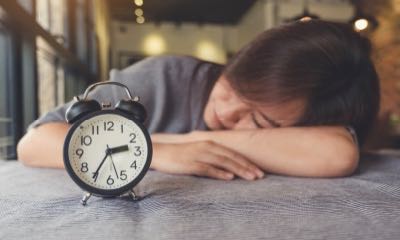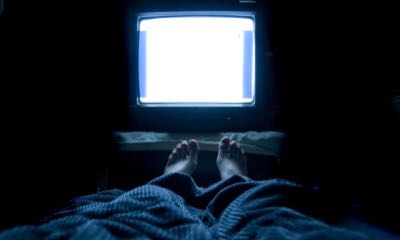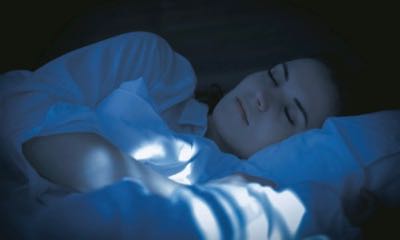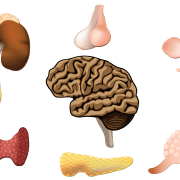When You’re Tired of Being Tired
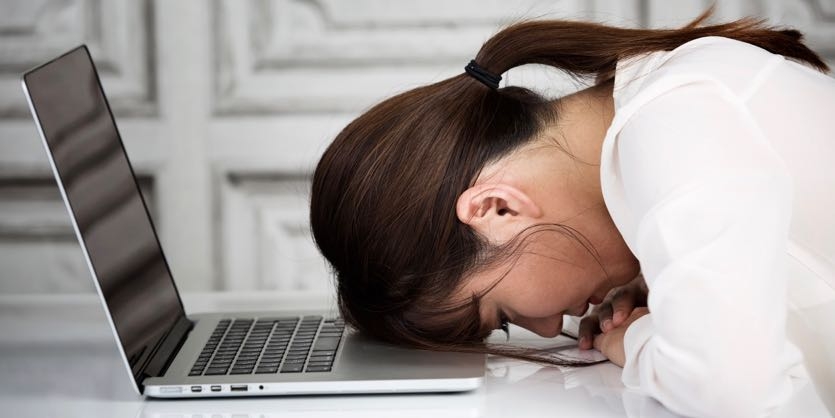
It’s the tagline of everybody’s 3:00-in-the-afternoon slump. It’s that three-word utterance you’re so familiar with you probably don’t realize how often you say it: “I’m so tired.”
But why? What brings you to this point of heavy-lidded fatigue and exhaustion? Besides the obvious, easy answer—lack of sleep. But that answer’s simplicity is deceptive and implies that lack of sleep is easy to overcome and undo. As if getting enough sleep to fully power your day could be as simple as turning off your bedside lamp at night.
The reality of feeling and being tired is much more complex and convoluted. There’s traffic, schedule conflicts, and personal commitments. Carpools, gym trips, and the decision between cooking and takeout. It all drains the precious energy resources you have for the day.
On top of all of that, the fact artificial light (put off by all the technology everyone relies on) extends each day, encouraging you to work later and stay up longer. Research supports this new reality. And the effects are concerning. A recent global study showed that lack of sleep significantly impairs verbal skills and reasoning—things you depend on every day. In fact, researchers equated getting as few as four hours of sleep per night to aging eight years.
Changing your routine, slowing down your life, or decreasing screen time may be difficult. So, let’s start with something simple—awareness. Developing a better understanding of your personal expression of tired is helpful. What gets you there? How does it feel both mentally and physically?
Once you’re in tune with your own hallmarks of feeling tired, you can react quickly to assess and address your needs. Over time, this awareness will help you build preventive strategies, to keep you from experiencing unnecessary tiredness before it happens.
Signs & Symptoms of Tiredness
Awareness starts by knowing what you’re looking for. In the case of being tired, it’s both signs and symptoms. (They’re common and similar terms, but there is a difference.) Signs are what others can detect about you, because they’re visible from the outside. Symptoms are what you personally experience—what can be described by you alone.
When it comes to tiredness, a sign could be excessive yawning. This is something easily noticed by a friend who might say, “Wow, I see you’ve been yawning a lot. Did you get enough sleep last night?” A symptom could be mental fogginess, which isn’t outwardly visible to a friend, even though you are perceiving and experiencing it.
Here are a few more examples of the signs and symptoms of tiredness:
| Signs | Symptoms | |
| Emotional | irritability,
increased sensitivity, and anxiety or depression |
anxiety or depression |
| Mental | forgetfulness | lack of focus or concentration, and
mental fogginess |
| Physical | frequent yawning or
unintentional dozing |
headaches or
muscle fatigue |
While these might seem obvious, there will be unique signs and symptoms for every person. As you become more fatigued, you may exhibit more emotional than physical signs of tiredness. Perhaps you lash out at a friend and immediately realize your overreaction. Or, when you’re tired, you become more easily stressed or upset by day-to-day hiccups than you normally would. Maybe you cry at something touching when that’s not your usual nature.
Research shows that sleep loss or deprivation can cause a sort of disconnection in the brain. Specifically, the part of your brain that controls emotion effectively shuts down. The failure of these control mechanisms when you’re tired gives rise to irrational reactions despite your best intentions.
While this isn’t exactly surprising, it is an interesting alternative to what you normally hear about the need for sleep. Yes, you need sleep to feel well-rested and physically rejuvenated. But you also need sleep to restore the brain connections responsible for emotion. This prepares you for the social interactions and challenges of the day ahead.
Don’t Let Feeling Tired Destroy Your Diet
Other unique signs and symptoms of tiredness may relate to your diet. While some may experience a decrease in appetite, research shows most people are affected in the opposite way. With increasing feelings of tiredness, the body loses its ability to evaluate appetite, which can lead to overeating.
Additionally, as you become more tired, you crave more calorie-dense foods. And you’re more likely to reach for snacks that are high in fat. That’s why research shows a connection between obesity and sleep deprivation.
Taken together, it’s important to understand how your body and mind respond to feeling tired. It can have negative effects on your mental and physical health. If not addressed, these can lead to detrimental social occurrences or develop into long-lasting habits of overeating.
Hopefully, you have a better understanding of how your own body is affected by getting tired. Let’s switch gears and focus more on when those feelings of being tired kick in.
Need A Nap? How to Beat the Afternoon Slump
It’s 3 o’clock. Your lunch has settled and your belly is warm. The hum of your computer feels and sounds like a lullaby. The text on your screen begins to blur together as your eyelids softly close once … twice … and then ahh, it feels so nice. Why don’t you just leave your eyes closed for a moment?
The dreaded afternoon slump rears its ugly head once again. The good news is a few simple tricks can help you beat this monster into submission. Try out these ideas and see if they work well for you:
- Eat a breakfast rich in protein. Studies have shown that meals (especially breakfast) that include protein and fiber are associated with better sleep quality. If you can, decrease the carbohydrate portion (if any) in your breakfast and substitute it for protein. This will help you feel fuller for longer, help with daytime alertness, and nighttime sleep. Here’s an idea: skip the bagel and go for an egg.
- Avoid caffeine late in the day. While caffeine has its perks, overloading too much can wreck your nighttime rest. Consider not going for the second (or third, or fourth) cup of coffee or tea as the day wears on. If that’s not an option, try cutting back on the amount of caffeinated beverages in each cup you drink.
- Bring healthy snacks along. Before you start feeling tired, reach for a healthy snack. Something with protein, like nuts, can help you feel more alert and full. Another idea: try a satisfyingly crunchy snack like carrots, celery, or apple paired with your favorite nut butter. Small, frequent snacks can ward off hunger throughout the day. They also help you stay powered up and focused on the tasks at hand.
Busting the Tall Tales of Tiredness
Lastly, arm yourself with helpful truths about sleep. There is a lot of misleading or confusing information out there. And wading through it all can be exhausting—exactly what you’re trying to avoid!
Here are three common myths about sleep—let’s debunk each one:
-
You have to get eight hours of sleep each night to be well rested.
False! You probably have “eight” in your head like it’s a magic number. A lot of people believe eight hours of sleep is the key to solving daytime fatigue or nighttime sleep issues. While eight hours might be the right amount of rest for you, it’s not universal.
This figure comes from research on thousands of people and reflects an average. That means there are plenty of people who fall on either side of eight hours per night. So, if you’re someone who sleeps for six hours each night and wakes up feeling well-rested and rejuvenated—that’s great. You’re doing just what your body needs. Don’t change. The same is true if you replace that six with 10. The issue arises if you sleep some number of hours per night—whether it’s eight or not—and you wake up feeling exhausted and foggy.
Moral of the story: don’t get stuck on eight. Find out what works for you and try to build a routine around your personal number.
-
Naps are great for making up for lost sleep. The longer the nap, the better.
This one is both true and false. While naps can assist in making up for lack of sleep, there is a strategy to follow. It has to do with the time of day you nap and for how long.
Dr. W. Chris Winter, a neurologist and somnologist (brain and sleep doctor), suggests you try to nap in the morning or earlier in the day. Think of it as adding to the previous night’s sleep. The alternative route—napping in the afternoon or later in the day—robs you of a longer sleep session later that night.
Secondly, rethink how long your naps last. Two-hour naps are, in fact, not naps. They’re daytime sleep sessions. Instead, consider how long it takes you to fall asleep (usually 10-15 minutes) and add 20. Set an alarm for 30-45 minutes, giving you enough time to drift off and stay there for a solid, sensible session.
-
Getting in bed with the TV on helps me fall asleep.
This might seem true for you, but perhaps not for the right reasons.
Screens, and the blue light they emit, inhibit your body’s natural processes that help you go to sleep, namely melatonin production. Consider turning the screen off 30-90 minutes before you go to bed. If that’s difficult, try for 15 minutes and apply a blue light filter to the screen you’re using (easy to do on a smartphone, computer, or tablet).
Perhaps what you enjoy about a TV at bedtime is the white noise it emits as you drift off. Opt for a sound machine that doesn’t come with the blue light. Sound machines come in many forms that may suit you, including apps on smartphones. If that’s not your style, a simple fan can do the trick.
Rest is Best
No matter who you are or what you do, you likely need more rest. That’s just the way modern life makes almost everyone feel. And you deserve more rest. Now you have the tools to get it.
After a look at barriers to restful sleep and stressors that keep you feeling tired, hopefully you understand how you can achieve more rest. Take stock of your habits, schedule, signs, and symptoms. With a little bit of planning and dedication, you’ll be free from constantly feeling tired.
Want to learn more? Visit What’s Up USANA? to find more tips about sound sleep habits.
References
https://www.cdc.gov/media/releases/2016/p0215-enough-sleep.html
https://www.ncbi.nlm.nih.gov/pmc/articles/PMC5015038/
Greer SM, Goldstein AN, Walker MP. The impact of sleep deprivation on food desire in the human brain. Nat Commun. 2013; 4: p. 2259.
Ward, A. “Somnology (SLEEP) Part 1 with W. Chris Winter.” Ologies Podcast.
Yoo, S. “The human emotional brain without sleep – a prefrontal amygdala disconnect.” Current Biology. 2007; 17: pp. R877-R878.




